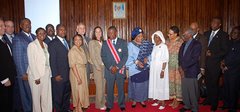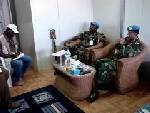
At least four people were killed in Guinea on Tuesday after the state of emergency declared on Monday night by President Lansana Conte to avoid a "civil war" entered its first day, according to reports reaching here.
At northern Guinea 's Labe , a demonstration was dispersed by the military leaving four people dead, the first deaths reported since the declaration of a state of emergency.
In the suburbs of Conakry , the capital, the situation remained tense on Tuesday night. The military backed by armored cars patrolled the mostly deserted streets while sporadic gunshots could be heard, according to diplomatic sources.
Unofficial sources place the number of dead at 100, including military officers in these strikes and demonstrations which were called in January by Guinean labor unions across this West African country with a population of 9.4 million.
The worsening of the situation has occasioned the worries of the international community. United Nation's Secretary General Ban Ki-Moon reiterated his "profound preoccupation" with the situation in Guinea while French Foreign Minister Phillipe Douste-Blazy appealed to Guinean authorities and trade unions to resume dialogue.
Having witnessed "the destruction and loss of human life" since the start of the strike and demonstrations, Conte on Monday decreed a state of emergency accompanied by a 20-hour curfew " across the country" until Feb. 23.
However, the curfew was modified by chief of the general staff Kerfalla Camara who authorized civilians to go about their business for six hours instead of four (from 12:00 to 18:00) while diplomats, Red Cross and civil servants saw their business hours increased from 08:00 to 18:00.
All public places with the exception of places of worship remain closed, public and private gatherings outlawed and searches authorized both during the day and at night but the airports and seaports remain open, announced Camara on national TV.
The new wave of demonstrations is aimed at forcing the resignation of the new Prime Minister Eugene Camara who was appointed on Friday night by Conte but seen as "too close" to the regime by labor unions who for the first time demanded the resignation of Conte, in power for the last 23 years.
The labor unions are "simply and purely" calling for the resignation of Conte which represents the "will of the people," said Ibrahima Fofana, one of the labor union officials quoted by Radio France International.
Guinea, which is experiencing a profound economic and political crisis, has been without a prime minister since last April when Conte dismissed Prime Minister Cellou Dalein Diallo and consolidated the powers of the prime minister and those of the president.
The appointment of a consensual "impartial" prime minister was part of the Jan. 27 agreement between the labor unions and the presidency as a prerequisite to the end of an 18-day general strike that began on Jan. 10 across the country.
According to organizers, the January strike which left 59 people dead was called to protest against corruption and misappropriation of public funds as well as the president's interference with the independence of the judiciary.
Meanwhile, information gathered by the GNN revealed that some former fighters of the defunct LURD and ULIMO are grouping themselves to join the Guinean soldiers in their bid to end the military stalemate in the country.
At northern Guinea 's Labe , a demonstration was dispersed by the military leaving four people dead, the first deaths reported since the declaration of a state of emergency.
In the suburbs of Conakry , the capital, the situation remained tense on Tuesday night. The military backed by armored cars patrolled the mostly deserted streets while sporadic gunshots could be heard, according to diplomatic sources.
Unofficial sources place the number of dead at 100, including military officers in these strikes and demonstrations which were called in January by Guinean labor unions across this West African country with a population of 9.4 million.
The worsening of the situation has occasioned the worries of the international community. United Nation's Secretary General Ban Ki-Moon reiterated his "profound preoccupation" with the situation in Guinea while French Foreign Minister Phillipe Douste-Blazy appealed to Guinean authorities and trade unions to resume dialogue.
Having witnessed "the destruction and loss of human life" since the start of the strike and demonstrations, Conte on Monday decreed a state of emergency accompanied by a 20-hour curfew " across the country" until Feb. 23.
However, the curfew was modified by chief of the general staff Kerfalla Camara who authorized civilians to go about their business for six hours instead of four (from 12:00 to 18:00) while diplomats, Red Cross and civil servants saw their business hours increased from 08:00 to 18:00.
All public places with the exception of places of worship remain closed, public and private gatherings outlawed and searches authorized both during the day and at night but the airports and seaports remain open, announced Camara on national TV.
The new wave of demonstrations is aimed at forcing the resignation of the new Prime Minister Eugene Camara who was appointed on Friday night by Conte but seen as "too close" to the regime by labor unions who for the first time demanded the resignation of Conte, in power for the last 23 years.
The labor unions are "simply and purely" calling for the resignation of Conte which represents the "will of the people," said Ibrahima Fofana, one of the labor union officials quoted by Radio France International.
Guinea, which is experiencing a profound economic and political crisis, has been without a prime minister since last April when Conte dismissed Prime Minister Cellou Dalein Diallo and consolidated the powers of the prime minister and those of the president.
The appointment of a consensual "impartial" prime minister was part of the Jan. 27 agreement between the labor unions and the presidency as a prerequisite to the end of an 18-day general strike that began on Jan. 10 across the country.
According to organizers, the January strike which left 59 people dead was called to protest against corruption and misappropriation of public funds as well as the president's interference with the independence of the judiciary.
Meanwhile, information gathered by the GNN revealed that some former fighters of the defunct LURD and ULIMO are grouping themselves to join the Guinean soldiers in their bid to end the military stalemate in the country.



No comments:
Post a Comment